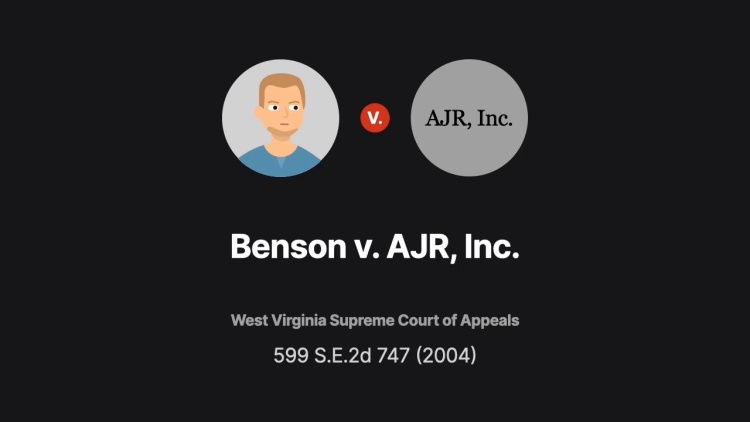Benson v. AJR, Inc.
West Virginia Supreme Court of Appeals
599 S.E.2d 747 (2004)
- Written by Robert Cane, JD
Facts
Danny Benson (plaintiff) worked for AJR, Incorporated (defendant) as a general welder, starting in 1990. Benson was the son of one of AJR’s owners. In 1997, Benson received a promotion to supervisor and was put in charge of AJR’s safety programs and of enforcing safety rules. Later that year, AJR’s owners sold the company to John Rhodes (defendant), an employee. Rhodes agreed to an employment contract with Benson as part of the sale. The agreement guaranteed employment for Benson for eight years. AJR retained the right to terminate Benson though it would have to continue paying Benson his salary unless he was terminated for dishonesty or conviction of a felony. If Benson resigned voluntarily, he would receive nothing. One month later, Benson received an employee manual that specified an employee could be terminated for use of controlled substances while working. He also signed a form consenting to random drug tests. In March 1998, AJR administered drug tests to its employees. Before the results were returned, Rhodes met with AJR employees, including Benson, and asked whether anyone had knowledge of any employees using drugs. Benson said nothing. Benson tested positive for cocaine. AJR terminated Benson and 11 other employees who tested positive for drugs. One of the forms that AJR prepared for Benson’s termination indicated that the reason for his termination was testing positive for cocaine. Benson filed an action against AJR for breach of employment contract. The trial court granted summary judgment in favor of AJR, finding that Benson was terminated for dishonesty after using dictionary definitions to interpret the meaning of dishonesty in the contract. Benson appealed.
Rule of Law
Issue
Holding and Reasoning (Per curiam)
Concurrence (Starcher, J.)
Concurrence/Dissent (Maynard, C.J.)
What to do next…
Here's why 907,000 law students have relied on our case briefs:
- Written by law professors and practitioners, not other law students. 47,100 briefs, keyed to 996 casebooks. Top-notch customer support.
- The right amount of information, includes the facts, issues, rule of law, holding and reasoning, and any concurrences and dissents.
- Access in your classes, works on your mobile and tablet. Massive library of related video lessons and high quality multiple-choice questions.
- Easy to use, uniform format for every case brief. Written in plain English, not in legalese. Our briefs summarize and simplify; they don’t just repeat the court’s language.





